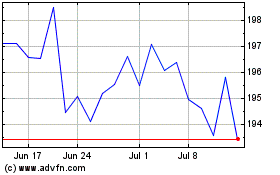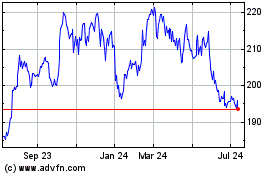UPDATE: CBOE Sees No Threat From An S&P-Dow Jones Index Deal
October 05 2011 - 1:39PM
Dow Jones News
The parent of the Chicago Board Options Exchange said Wednesday
its long-running license to trade options on the Standard &
Poor's 500 stock index would not be threatened by a potential deal
combining the index with the Dow Jones Industrial Average.
Such a deal, reported last week by The Wall Street Journal to be
under discussion, could give Dow Jones Indexes owner CME Group Inc.
(CME) more sway over how the S&P indexes are used in
derivatives trading. CBOE shares fell 4.9% the following
session.
"This would have no immediate effect on our license," said
Richard DuFour, head of corporate planning and development for CBOE
Holdings Inc. (CBOE), speaking at an investor presentation
Wednesday. "Our license provides for any change of control."
CME and McGraw-Hill Cos. (MHP), which owns Standard &
Poor's, on Wednesday declined comment on the matter.
The CBOE's nearly 20-year-old arrangement to exclusively trade
options on the S&P 500 is critical to the company, which went
public last year. Contracts linked to the index's value make up its
most heavily traded market and contribute about 22% of the CBOE's
transaction revenues, according to an estimate from Evercore. This
week the CBOE launched a long-awaited electronic version of the
options on its new venue for automated trading, called C2.
The license grants the CBOE exclusive rights to trade the
popular contracts through 2018, and until 2022 on a non-exclusive
basis, should S&P decide to give other exchange groups a crack
at trading the contracts.
DuFour said Wednesday that he saw "nothing but positives" should
CME and McGraw hill agree to an index deal, which people familiar
with the matter have said could give CME a 25% stake in a new joint
venture that McGraw-Hill would manage.
"The CME understands as well as we do the synergies between our
products and theirs," said DuFour. Chicago-based CME's most heavily
traded stock-index futures are based on the S&P 500 index, and
DuFour said the same banks and firms trade heavily in both
derivatives markets.
"There's no particular advantage to be gained in splitting up
the liquidity," said DuFour.
CBOE shares were up 1.2% Wednesday at $24.60.
DuFour said that Standard & Poor's has benefited from the
CBOE's stewardship of the index options. The exchange pays S&P
royalties on each contract traded and the indexer collects other
fees related to the CBOE's proprietary VIX volatility index, which
is tied to prices of S&P options.
"We have a huge advantage because of the intertwining of S&P
and VIX," said DuFour. "If someone else had the exclusive [license
to trade S&P options], there would be no VIX revenue for
S&P."
The CBOE could continue to calculate the widely followed VIX
using options on exchange-traded funds that track the index, DuFour
said. The VIX also fuels fast-growing options and futures markets
run by the CBOE, and the exchange company is holding talks with
other exchanges on licensing the measure.
News Corp.'s (NWS) Dow Jones & Co., publisher of The Wall
Street Journal and this newswire, is a minority partner in Dow
Jones Indexes.
-By Jacob Bunge, Dow Jones Newswires; 312-750-4117;
jacob.bunge@dowjones.com
CME (NASDAQ:CME)
Historical Stock Chart
From Jun 2024 to Jul 2024

CME (NASDAQ:CME)
Historical Stock Chart
From Jul 2023 to Jul 2024
